SEO analytics is about collecting and analyzing metrics required for website optimization. With accurate SEO data, you understand what drawbacks make you rank lower than expected. SEO analytics combines dozens of indicators characterizing the website from all sides, be it content quality or tech SEO. Use SEO analytics software to monitor technical health, on-page issues, and user behavior in one place. Analytics SEO software helps track site performance trends and make informed decisions about keyword strategies.
But since SEO data volume is so enormous, you cannot track SEO manually. You must connect professional SEO software that audomes SEO tracking.
SEO analytics tools allow you to:
-
- Discover ranking opportunities for keywords with high reach.
- Detect organic traffic sources with the most conversions.
- Determine web page loading speed.
- Find out why visitors act as they do.
- Find SEO gaps and opportunities to fix them.
Good SEO analytics tools also provide clear guidelines on what to improve, serving as reliable support for newbies. Take a quick look at the top 18 best SEO analytics tools. With the right analytics SEO tool, you can get clear data on content quality and ranking progress. If you want quick wins, start with the best SEO analyzer tool for tracking on-page elements.
What is SEO Analytics?
Though it seems sophisticated, SEO analytics is simply smart data—not rocket science. It’s like having a GPS for your website, pointing you toward success. You are, however, negotiating keywords, backlinks, and traffic statistics instead of streets and highways. SEO analytics is basically all about gathering and evaluating data to know how well search engine performance of your website is. Even the best SEO analyser can’t fix your content—but it can show you exactly what’s broken. SEO analytics offers the information you need to make wise judgments on anything from page traffic to keyword ranking to visitor falling off. Choosing the best online SEO analysis tool saves hours of manual checking and offers instant technical feedback.
See SEO analytics as your own investigator. It probes the performance of your site closely, noting areas that require work as well as those that are operating well. A reliable SEO analytics platform will continuously monitor your site and report any issues automatically. Does that latest blog post get natural traffic? Do your backlinks provide the authority your site requires? You’re flying blindly without SEO analytics. Using an SEO analytics tool lets you keep ahead of your rivals, evaluate traffic, and improve content. SEO analytic tools break down your site data into actionable steps for optimization. It’s about evaluating data and applying it to hone your plan, not only about compiling facts. So take an SEO analytics tool, let it handle the tough work, and apply those insights to maximize, enhance, and see how your SEO initiatives fly to fresh heights.
List of Best 18 SEO Analytics Tools
Examining the list of the Best 18 SEO Analytics Tools will help you realize every tool addresses several facets of your approach. The best SEO analytics software gives you both surface-level checks and deep technical scans. These all-in-one fixes not only streamline data analysis but also provide practical insights to improve your search results. Investing in the correct all-in-one SEO tool is a no-brainer if you really want to dominate SEO; it’s like having a full team of specialists working behind-scenes all in one location.
1. Plerdy SEO Analytics Tools
Trying to boost your SEO but can’t find the right analytics tool? Plerdy is like a Swiss knife for your website — one tool, tons of smart features. No fluff, just pure SEO data magic. You get everything you need in one dashboard. It’s analytics that actually help, not confuse you more. You’ll find the best SEO analysis tool is one that adapts to your workflow and scales with your website.
Plerdy SEO Checker
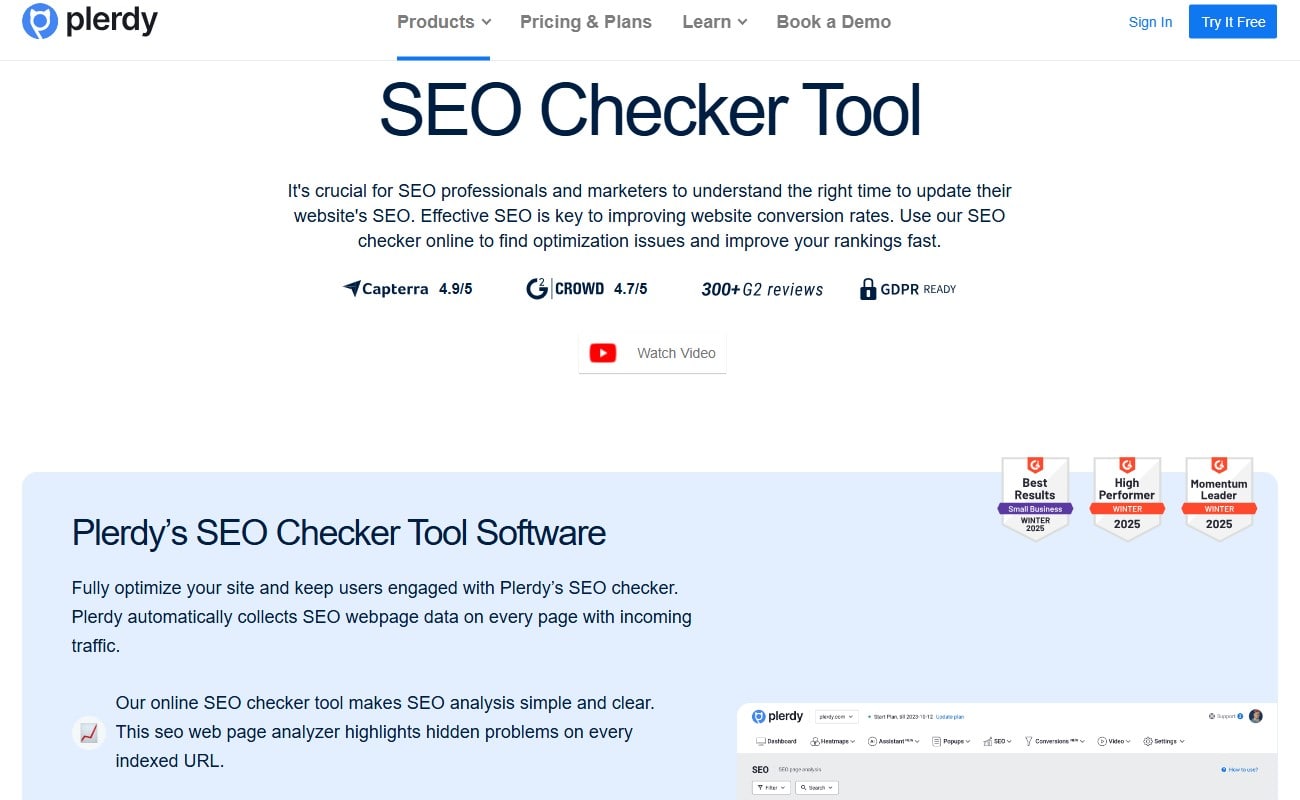
This SEO analytics tool works like a robot assistant. It runs checks daily (yes, daily!) and catches SEO problems before they cause traffic loss. You’ll see everything that’s wrong with your tags, content, keywords, and more. It’s one of those tools that feels like it’s working harder than you. Key SEO analytics features:
- Daily SEO scan of Titles, Descriptions, H1, Noindex and more – automated, fast, and hands-free.
- Connects with Google Search Console to detect keyword gaps and missing phrases in seconds.
- Shows real-time data on SEO health: errors, warnings, and changes in tags and structure.
- Tracks SEO history for 30 days to help you compare changes and analyze what worked.
Plerdy’s cloud-based solution works as powerful SEO analytic software for daily performance monitoring. This analytics tool handles over 1 million pages per day — that’s a lot of SEO data. You can export everything to Google Sheets, share with the team, or just geek out on the numbers yourself. Want proof? Check their SEO case studies — like how eCommerce brands fixed missing keywords and lifted their rankings without crying. This SEO website analysis software helps marketers and agencies eliminate technical roadblocks with ease. Many consider Plerdy among the best SEO analysis software options due to its smart alerts and full automation.
Read the TemplateMonster online store case study for practical SEO audit examples.
Plerdy Chrome SEO Analyzer
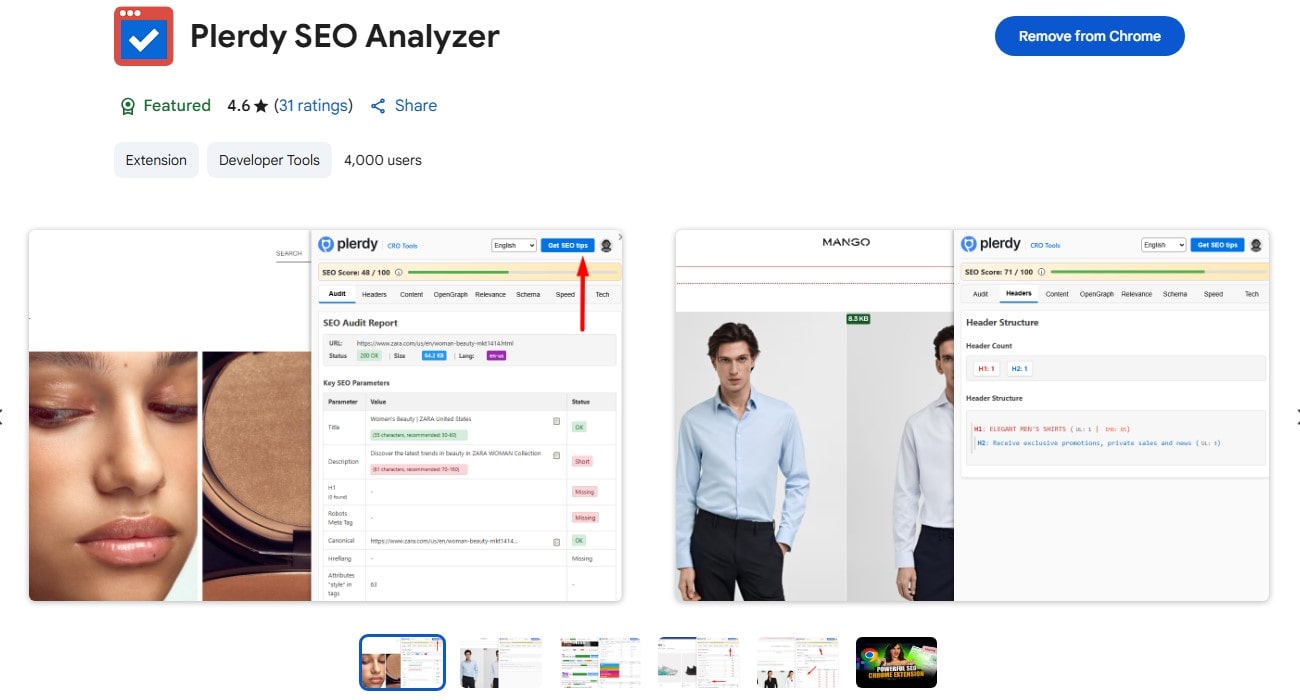
This Chrome extension is a mini SEO analytics lab in your browser. One click – and boom – full page audit. No logins, no waiting. Just quick SEO insights that actually make sense. Why this tool rocks:
- Real-time SEO analytics for any page – headers, meta tags, structure, alt texts.
- Performance data: page load speed, script issues, image delays. Fix what’s slow.
- Checks for schema, missing hreflang, and robots meta tags.
- Keyword optimization audit – find where your content lacks power.
With real-time SEO software analytics, the Chrome Analyzer gives you instant feedback without switching platforms. With this free SEO tool, you stop guessing. You start fixing. This analysis SEO tool is ideal for quick audits when you’re on the go or deep in campaign mode. Plerdy gives you two powerful SEO analytics tools — one cloud-based, one in your browser. Both are built to help marketers, agencies, and business owners get results fast without needing to be tech geniuses. So if you’re serious about leveling up your search rankings, start with a tool that shows you everything — Plerdy’s SEO Checker and Chrome SEO Analyzer. Easy to use, full of useful insights, and trusted by 300+ companies already.
2. Google Search Console
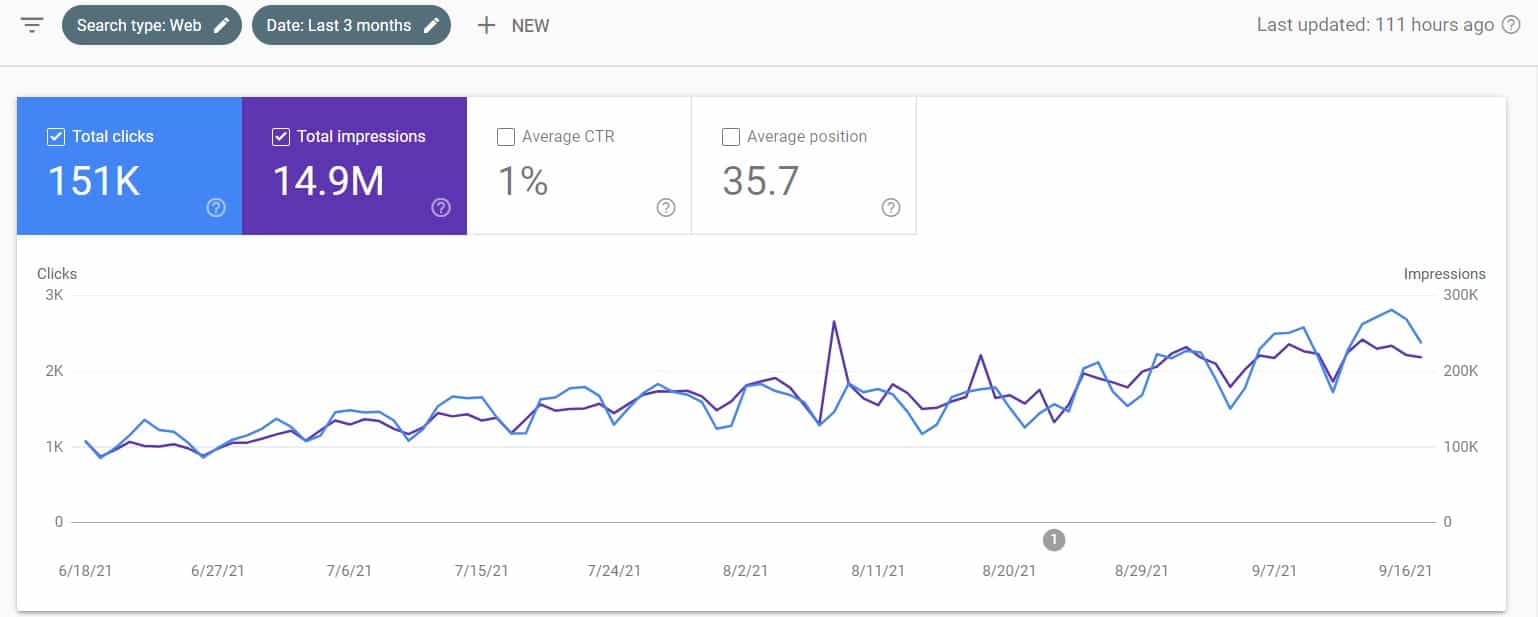
Google Search Console is one of the top search engine optimization analysis tools trusted by pros. This web service is the ultimate analytics tool for every SEO expert. It provides reports with the site’s ranking and the number of clicks based on Google Search. Here are the features to improve the website’s SEO:
- Analyze how Google sees the site. As a website SEO analysis tool, it helps you see what Google sees and fix issues before they hurt your ranking. Google Index URL Checker provides detailed information about indexing and crawling web pages and how they appear in search results.
- Mobile reports. Website user-friendliness when viewed on mobile devices.
- Advanced search results. Search Console analytics tool structures the received data and shows statistics of queries and clicks. These SEO site analysis tools inside Google Search Console cover everything from indexing to mobile usability.
- Page Usability Report (mobile URLs only). Download speed, stability, usability, and use of HTTPS.
- Sitemap Report. Detects errors, including URL inaccessibility or inability to crawl, compression error, invalid tag value, invalid XML, and unsupported file format.
- Internet Core Metrics Report or Core Web Vitals. The data comes from the protocols of the Chrome browser based on the LCP, FID, and CLS indices. LCP is an indicator of the period for which the browser renders the largest element on a website page: a video, a picture, or an information block. The FID shows the time between the first click on a link and the browser’s response. CLS shows the offset of elements on the page during the loading period.
Among the best SEO analysis tools, GSC stands out for real-time indexing insights and mobile-first reporting. Optimize SEO with Google data and boost rankings and conversions.
3. Google Analytics
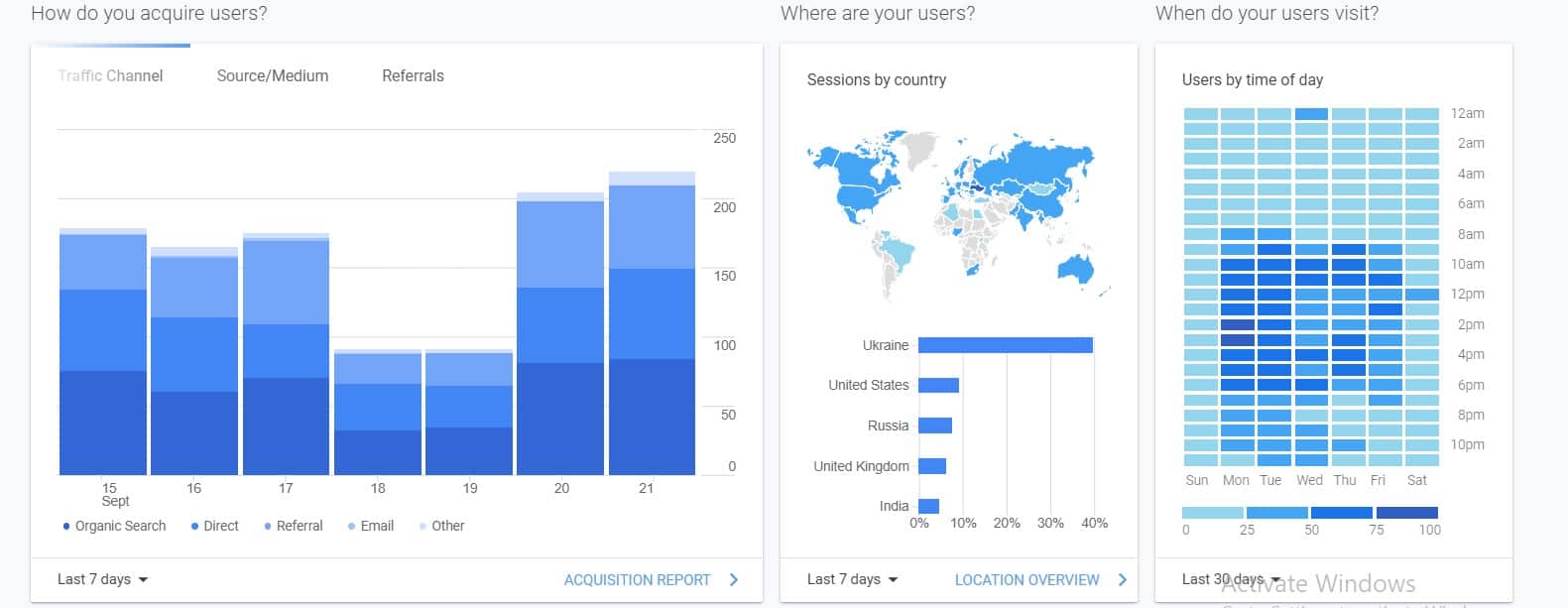
Google Analytics extracts and aggregates data to help track keywords when integrated with Google Search Console, popular website referrals, and more.
SEO professionals use Google Analytics in the following ways:
- Set SEO optimization goals. Check organic traffic volume, how much of it comes from potential customers, and the bounce rate. Design a thank you page that counts as a conversion or confirmation. It must have its URL and include a Noindex meta tag.
- Leverage the organic shopper segment. Include filters to remove spam traffic in the scan.
- Compare organic vs. non-organic visitors. Exclude organic traffic from metrics to see what repels guests.
- Create a data-driven content plan and analyze ineffective web pages to improve them.
- Find the most successful landing web page and follow its best practices to upgrade the less well-performing ones.
- Use the Content Drilldown report. View clicks and impressions on non-sales web pages. Analyze what topics visitors are interested in.
- Apply the multi-channel funnel report. Check Associated Conversions to be aware of organic visitors who return.
- Find referral websites. Explore additional link providers like bloggers, reporters, and partner web platforms.
- Create SEO reports. Segment results by location, URL, channels, etc.
Note that GA reports can be easily shared with employees and customers.
4. Neil Patel’s SEO Analyzer
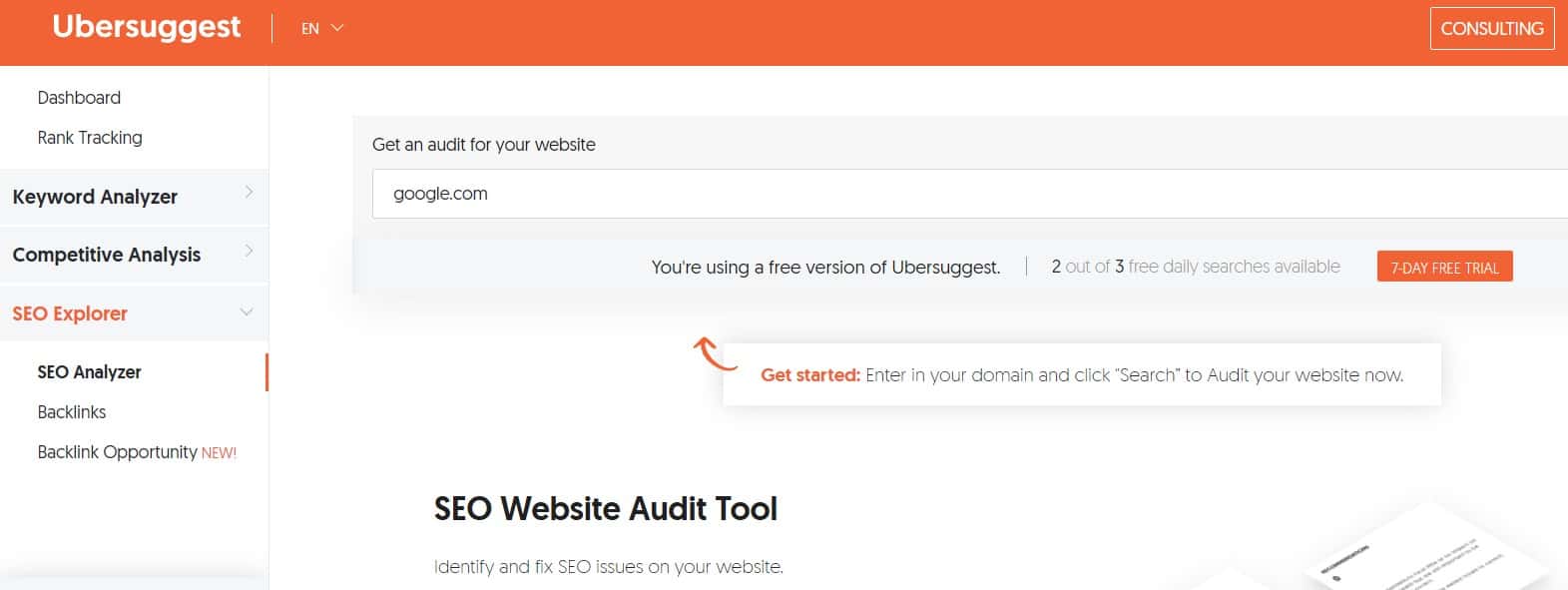 Neil Patel’s analytics tool allows you to perform:
Neil Patel’s analytics tool allows you to perform:
- SEO analysis. Indicates website errors that negatively affect rankings and provides a report with step-by-step instructions and video tutorials on troubleshooting.
- Backlink checking. Recognizes who links to the website, the domain’s ranking, and the overall traffic metrics.
The creator and CEO of the web platform is Neil Patel, author of New York Times publications and bestsellers. Forbes experts rank him among the top ten marketers globally, and the UN ranks him among the most promising entrepreneurs under 35. Shopify, Adobe, Microsoft, Dell, and eBay use these SEO and keyword analytics tools.
5. SEOptimer
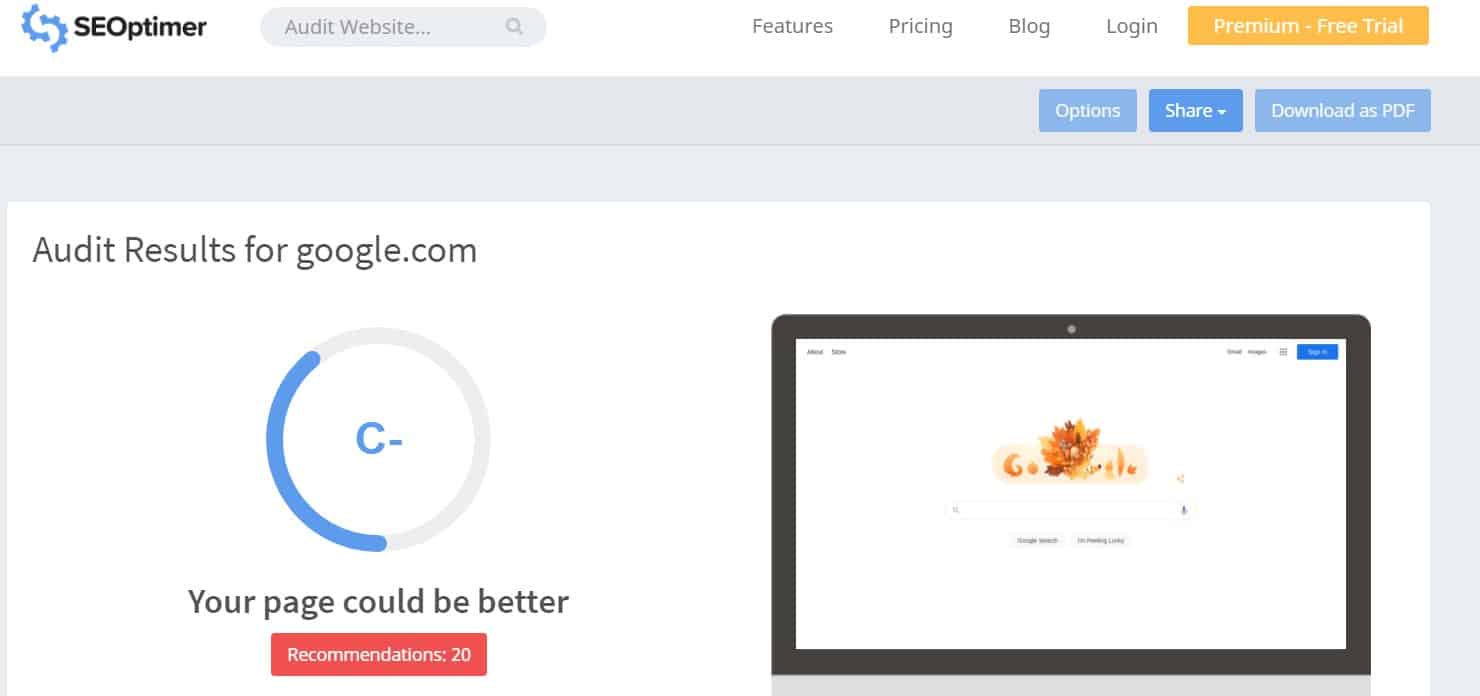
Paweł Rabinek created the platform in 2012. Since 2016, it has belonged to Adam Krzywda, Cyberport. SEOptimer analytics toolkit helps with SEO audit through:
- Comprehensive website crawling. Analyzes all the factors affecting the ranking, finds SEO problems and provides solutions.
- Branded reports in PDF format – White Label. Creates an attractive report with the company logo. You can independently change the font, languages and choose which sections to include.
- DIY SEO. Scans a website for SEO errors and monitors keyword rankings.
- Free SEO Tools – generators of meta tags, keywords, robots.txt, .htaccess files, and XML sitemap.
Deloitte, Ogilvy, and iProspect use such tools.
6. WooRank
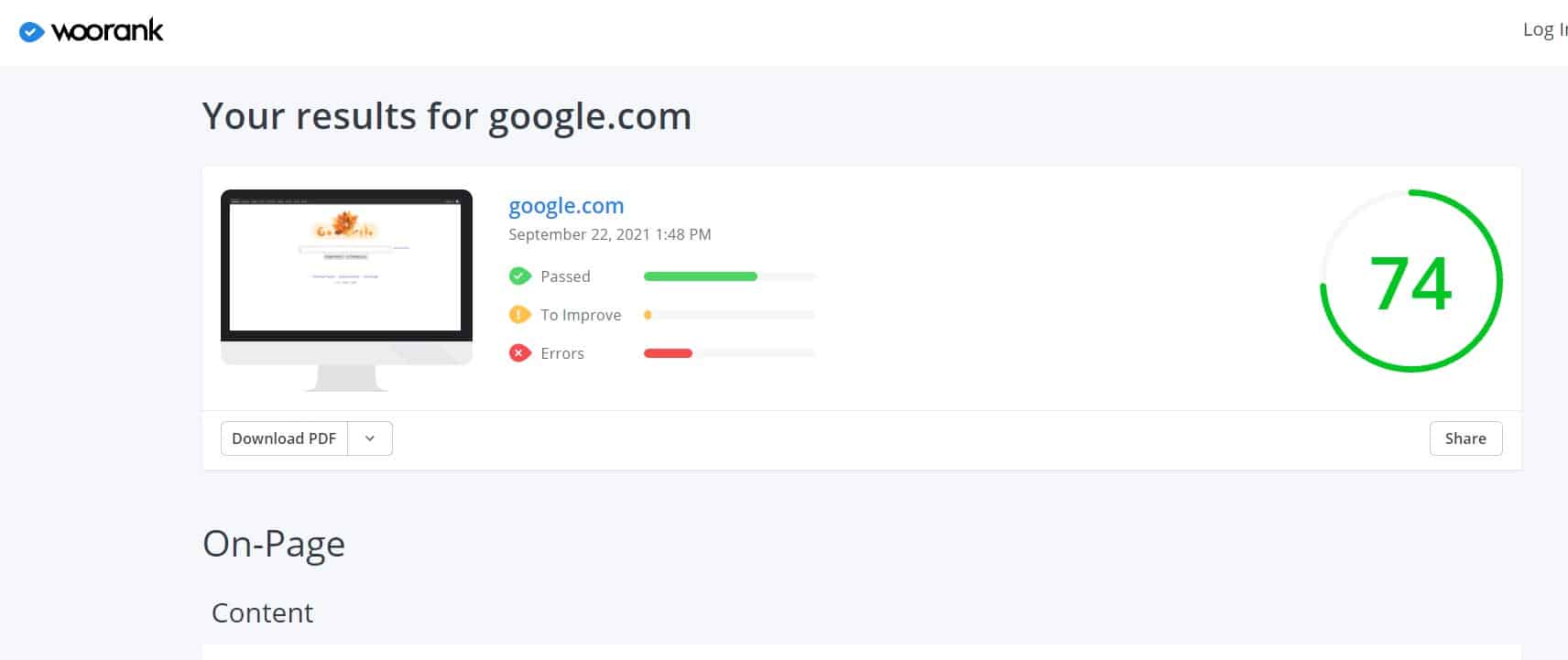
WooRank’s marketing and SEO analytics tools can:
- Track and suggest keywords. Research keywords for your business niche taking into account the city and country.
- Comprehensive technical analysis. Quickly check thousands of web pages and generate CSV reports to share them with a development team.
- SEO tasks. Run practical SEO checks to identify errors that harm the website ranking.
The clients include Forbes, GoDaddy, HubSpot, and SparkToro.
7. SEMRush
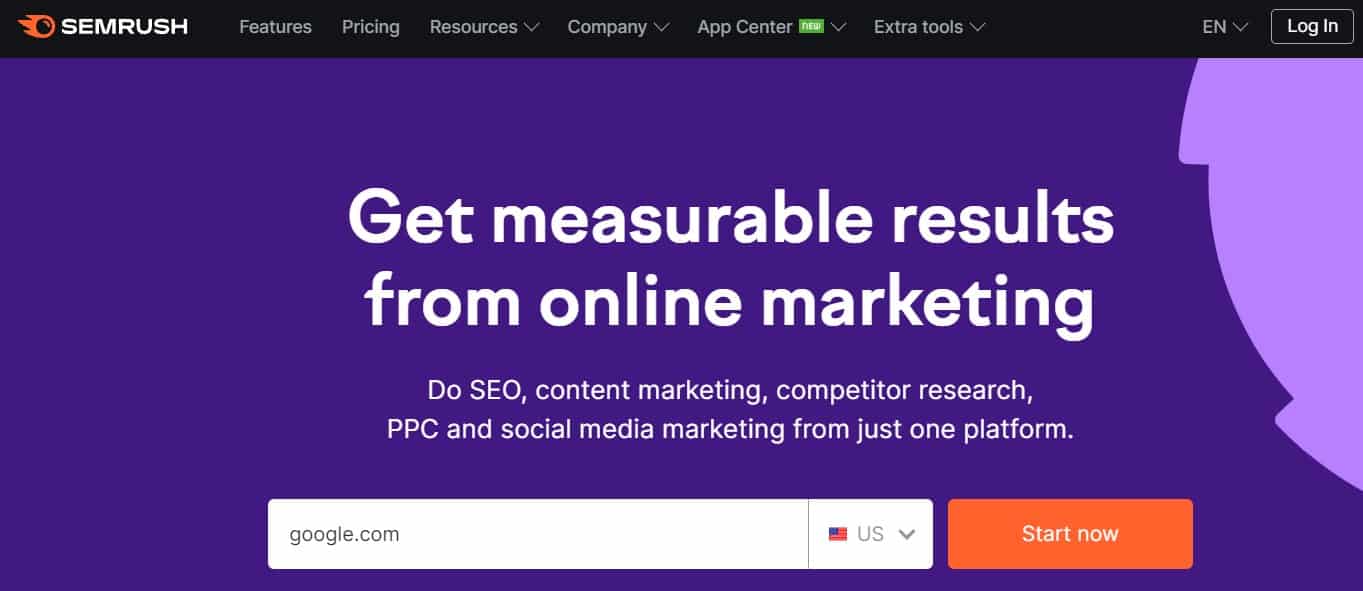
SEMRush provides customers with a bunch of technical analysis tools:
- Site audit: Reports on indexing, web page loading speed, HTTPS, and international SEO optimization.
- SEO Checker: Analyzes the factors that influence a website’s ranking on Google and lists issues to solve.
- Analyzing log files: Everything about how Googlebot interacts with the site.
SEMRush has operated since 2008 and has grown to seven offices on different continents. The founder of the company is Oleg Shchegolev. SEMRush’s loyal customers include Booking.com, Amazon, Tesla, Walmart, Samsung, and Quora.
8. Majestic SEO
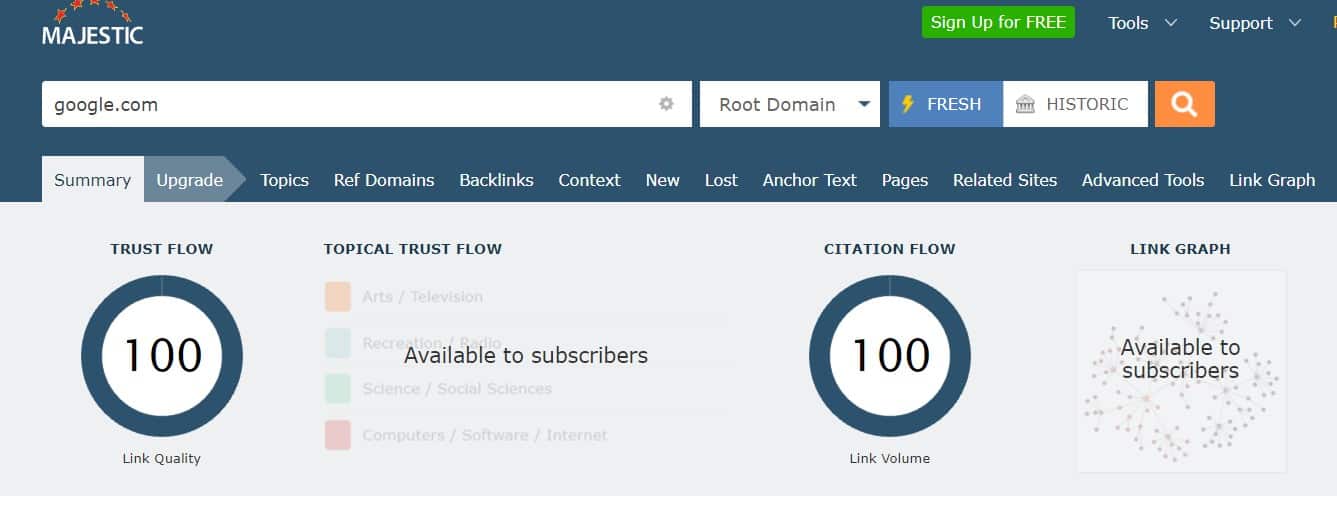 Majestic’s website analytics tools for SEO research include:
Majestic’s website analytics tools for SEO research include:
- Fast web page audits. The tools run tests using Flow Metric scores, link counts, and redirects.
- Keyword comparison. Study the competitiveness of key phrases.
- Detailed reports. In-depth analysis of the domain and backlinks. A great option for Penguin and Panda expertise.
- Search Explorer. Split the keyword score into categories: inTitle, inAnchor, and inURL.
Majestic is a startup by Alex Chudnovsky launched in England in 2004. Steven Pitchford joined the organization a bit later. Majestic has a colossal customer base who are attracted by the quality, transparency, reputation, and value of the services.
9. Raven Tools
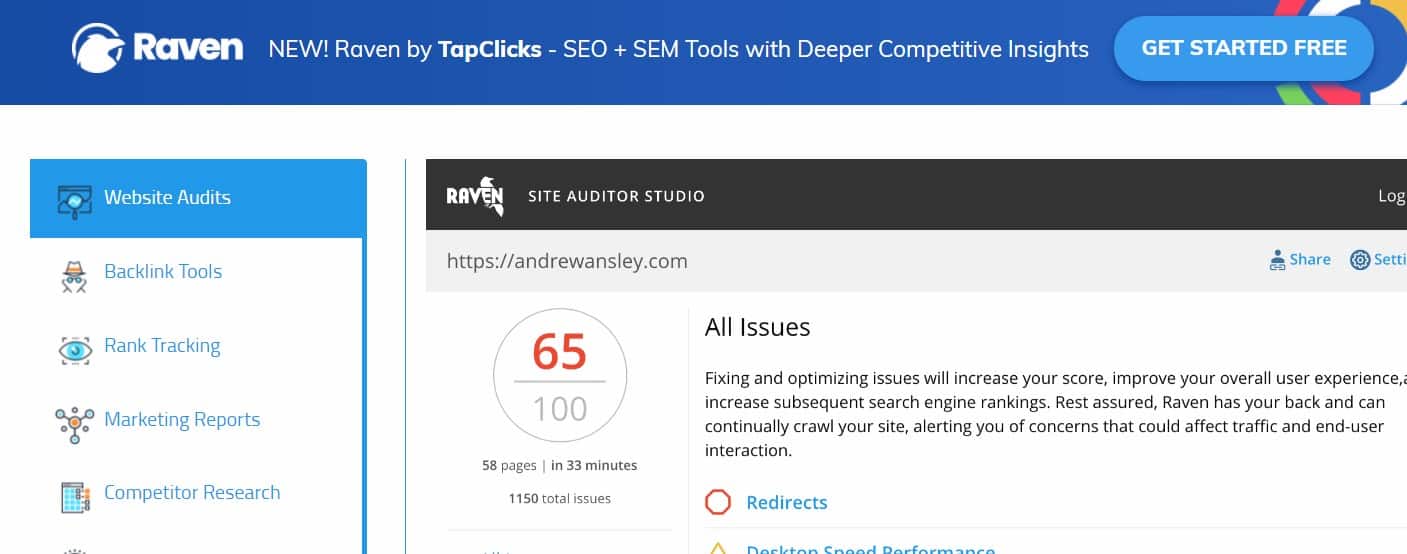
Website validation with Raven Tools relies on the following analytics tools:
- Website audit. Scans the web platform for errors that interfere with web rankings
- Raven Tools Rank Tracker. Scans Google, Bing, Yahoo, Yandex, or Baidu rankings based on postcode, language, or keyword lists.
- Marketing reports with over 30 models.
- Link manager. Track the backlinks you get or lose.
Raven Tools was founded in 2007 in Nashville, Tennessee (USA) and acquired by TapClicks, Inc in 2017. The company’s client list includes Edelman, True North, Reach Local, and Gannet.
10. Moz Analytics
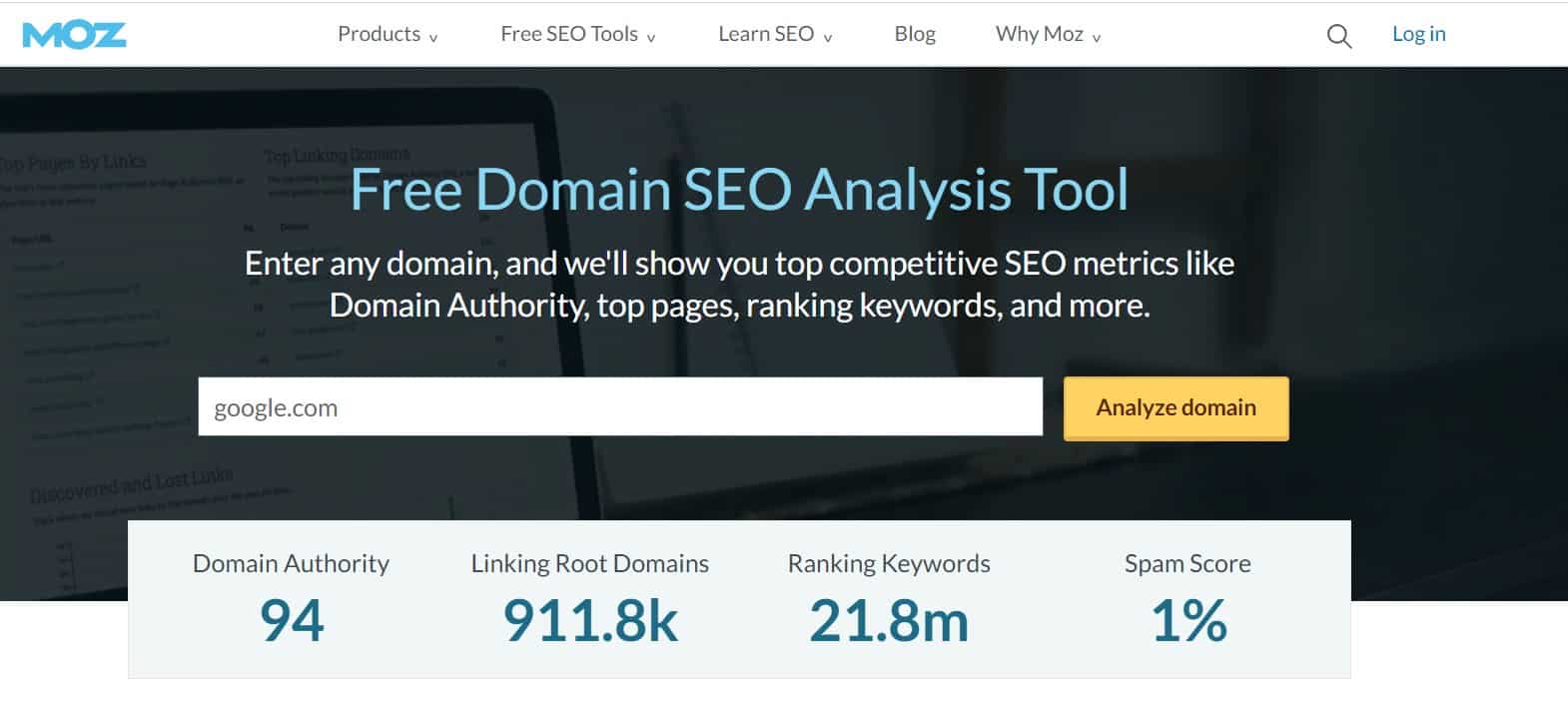
The company was founded by Rand Fishkin in 2004. For website SEO analysis, the platform provides:
- Keyword Explorer. Learn what words people enter to find web pages.
- Keyword ranking. The report demonstrates the online visibility of pages.
- Full website scan. Warns of errors before problems arise.
- Create reports. Choose items that will be included in the report and send them to clients.
SEO organizations often use Moz Analytics tools. Its clients also include Alaska, 99designs, Zillow, Trivago, and Razorfish.
11. Seolyzer
 Seolyzer.io does log analysis for SEO to research how engines view your website. When crawling bots browse sites, they leave traces in the server’s log files. Seolyzer.io tools aggregate this unused info and turn it into SEO KPIs/actions. You may need to detect and correct errors, monitor speed performance or fix redirections to improve organic traffic.
Seolyzer.io does log analysis for SEO to research how engines view your website. When crawling bots browse sites, they leave traces in the server’s log files. Seolyzer.io tools aggregate this unused info and turn it into SEO KPIs/actions. You may need to detect and correct errors, monitor speed performance or fix redirections to improve organic traffic.
AirFrance, Decathlon, Elle, Calvin Klein, and Just East trust this tool for tech SEO.
12. Ahrefs

Ahrefs is a stellar SEO and keyword analytics tool. Enter a URL to measure critical indicators affecting search performance instantly. The tool also supports keyword analysis functionality to help you pick the most suitable keywords for website content. Check new ranking keywords, the least/most popular options, and phrases used by competitors. Each entry has difficulty, traffic, clicks, and parent topics indicated. The filtering available in the keyword analytics section is genuinely remarkable.
Facebook, eBay, Pinterest, SurveyMonkey, Uber, and Adobe utilize Ahrefs.
13. SEO Marketing Software

SEO Marketing Software is a tool in HubSpot’s Marketing Hub. It integrates with HubSpot’s content management tools, making website optimization super easy. Get a chance to:
- View how to optimize a website for search in one location.
- Plan your content strategy by getting topic suggestions based on competition and relevance.
- Generate reports from multiple integrated analytics tools.
Reddit, Loom, Casio, Monday.com, and Reddit have connected to Hubspot Marketing Hub tools.
14. Keyword Hero

This tool from Berlin, Germany, detects the best-matching keywords for your website. Its creators recommend combining the platform with Google Analytics for more comprehensive information. Get the Keyword Hero tools to:
- Check the traffic and conversion from intended target keywords.
- Recognize informational vs. transactional queries.
- Distinguish between brand and non-brand traffic.
Over 40000+ companies already have this platform.
15. Serpstat

Serpstat is an all-in-one platform for online visibility management. It combines over 30 web analytics tools, including a rank tracker for complete SERP research, backlink analysis, and site audit. The keyword research feature offers in-depth URL analysis, search questions, “three-view” keyword distribution, and other extraordinary capabilities.
Samsung, Uber, Shopify, Rakuten Viber, and Deloitte are loyal to Serpstat keyword tools.
16. SE Ranking

SE Ranking is an optimum analytics tool for small businesses, SEO professionals, and agencies. With a complete set of features for keyword position tracking, suggestion, and grouping, you get some unique ones like SEO/PPC Competitive Research. It shows you the keywords and ads competitors target in their organic search and paid campaigns.
Wargaming.net, Zapier, Hunter, Trustpilot, and Cars.com are among SE Ranking users.
17. SpyFu

SpyFu tools have standard SEO/keyword analytics functionality with some specialties like Google Ads Advisor and Google Ads templates.
These tools enable several ways to grow web traffic – You run search engine optimization to attract organic visitors and launch digital advertising. Besides, SpyFu has an API for companies that want to embed its functionality.
Adobe, Amazon, Twilio, and Microsoft use SpyFu.
18. Seomator

Seomator is less renowned than other options on the list, but it provides excellent SEO analytics. It crawls pages to formulate How-To-Fix Tips and 13 different reports. Integrate it with WordPress, Salesforce, Slack, and MailChimp for extended capabilities.
Seomator is particularly handy for SEO agencies as it supports branding for white-label reports. Deliver these summaries to customers, saving hours of routine work.
Devrix, Reliablesoft, ZEO, and Digital Olympus use Seomator.
Conclusions
It’s time to go to work now that you know the best link-building techniques. Like the Swiss Army knife of SEO, these tools are flexible, strong, and indispensable for everyone serious about ascending the search engine results page. Link building is beautiful in that it increases the authority of your website and creates relationships with other excellent sites. Without the appropriate tools, though, you are effectively attempting to construct a house with just a hammer. These instruments then help you to simplify your work and offer the knowledge required to adjust your plan.
These tools will enable you to keep ahead of the curve in the always shifting field of SEO from automating your outreach to backlink profile analysis. Link building is about creating meaningful, quality relationships Google will adore, not only statistics. So, grab your preferred tool, start creating those important links, and see how your site rises the search engine results instead of merely waiting for your rankings to get better. Though link building is a marathon rather than a sprint, with these tools in your toolkit you will be reaching the finish line quickly. Let’s get linked!
